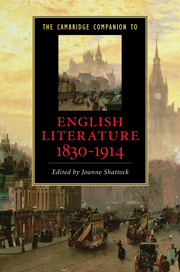11 - Writing and religion
from Part II - Intersections and incursions
Published online by Cambridge University Press: 28 November 2010
Summary
In the summer of 1867 the Reverend Charles Lutwidge Dodgson, now better known to the world as 'Lewis Carroll', set off on his only trip beyond the shores of England. He travelled with his friend and fellow Oxford don Canon Henry Liddon, to Russia. This was an unusual destination for cultured and curious Englishmen at the time. Italy, France or even Germany would have seemed more obvious choices, but Liddon, with Dodgson’s evident acquiescence, had a pilgrimage in mind. Their spiritual goal lay beyond what Western Europe had to offer. Liddon was seeking both to extend his knowledge of the Orthodox Church and to foster the spiritual links between the state churches of England and Russia in the hope of some ultimate alliance between those European Christians who rejected not simply the authority of the pope but also current movements within Roman Catholicism to declare the Holy Father infallible. Dodgson was less assiduous in his sense of mission than Liddon, but, as the journal he kept during the trip across Europe reveals, he was full of intellectual curiosity.
Both men were determined to encounter religious customs which appeared, at a distance, to be both rich and strange. They travelled by train via Brussels and Cologne (where Dodgson experienced elaborate Catholic ceremonial for the first time) and then on to Berlin, where they visited the new Synagogue in the Oranienburgstrasse (Jewish worship striking Dodgson as 'perfectly novel to me & most interesting'). After extended sight-seeing stop-overs in Lutheran Danzig and Ko¨ nigsberg they finally arrived at St Petersburg on 27 July. On their first Sunday in Russia they went to the morning liturgy celebrated at St Isaac’s Cathedral. Notwithstanding the splendour of Orthodox worship, Dodgson’s assured sense of Anglican decorum remained unassailed (‘the more one sees of these gorgeous services, with their many appeals to the senses, the more, I think, one learns to love the plain, simple … service of the English church’).
- Type
- Chapter
- Information
- The Cambridge Companion to English Literature, 1830–1914 , pp. 205 - 221Publisher: Cambridge University PressPrint publication year: 2010

